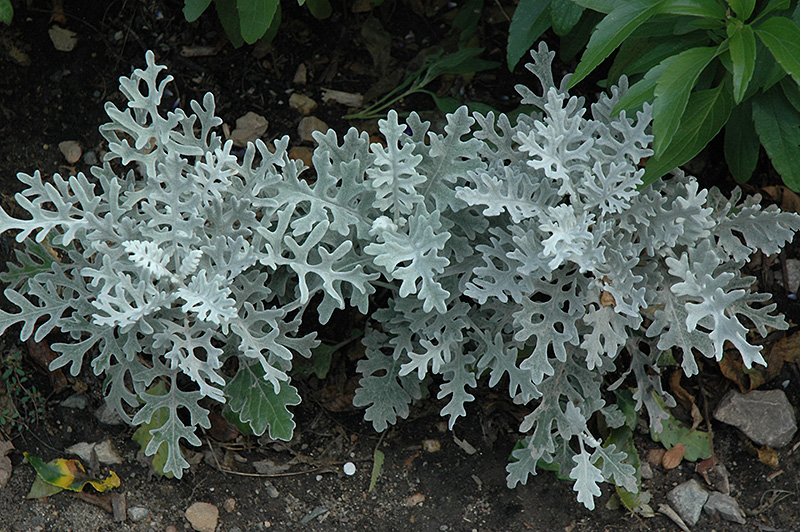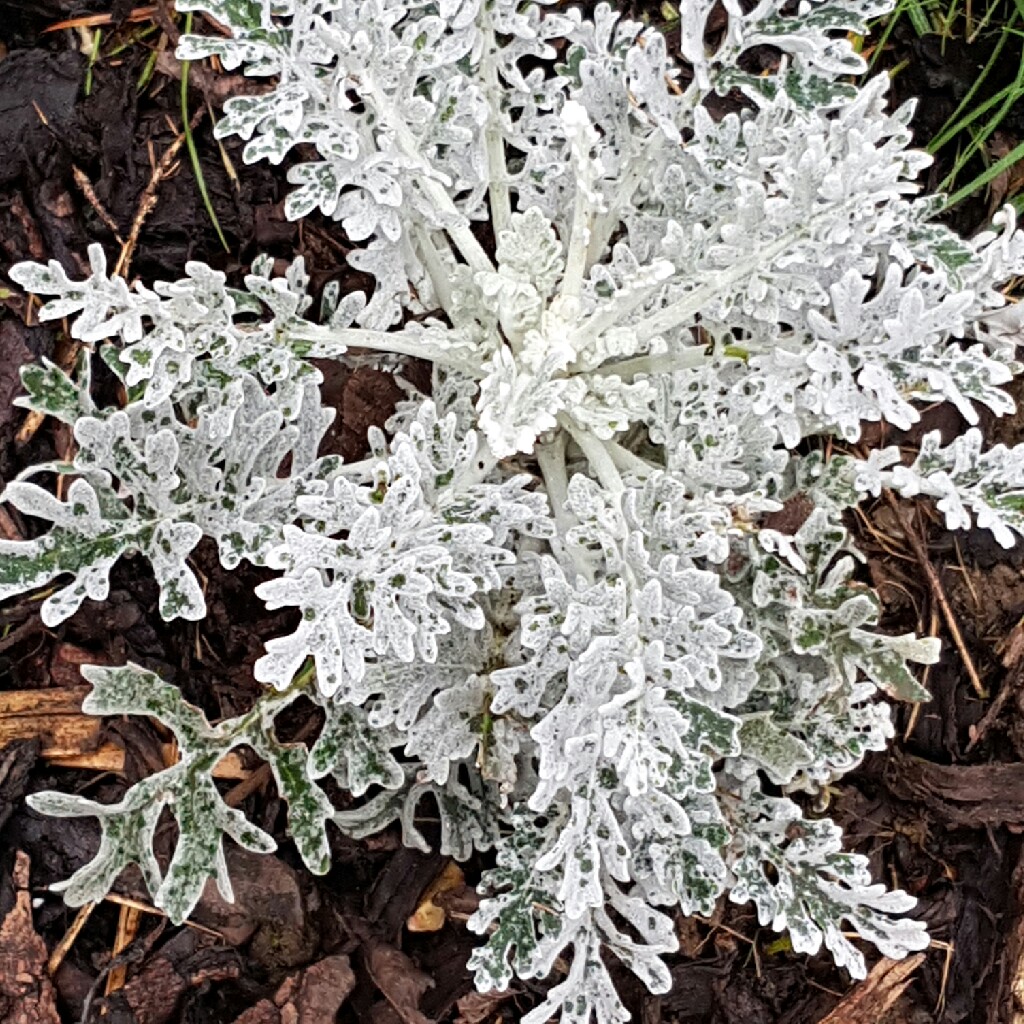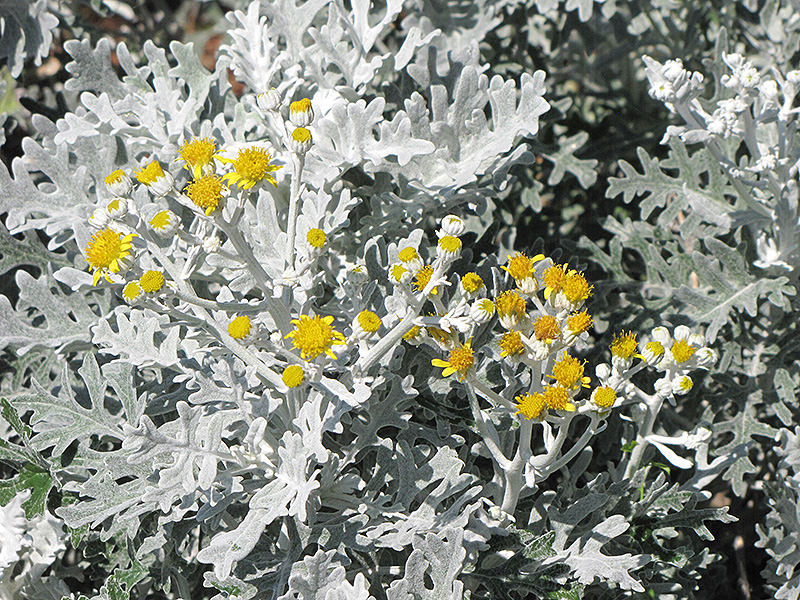
Senecio cineraria 'Silver Dust' BBC Gardeners World Magazine
Senecio cineraria ( Silver Dust Dusty Miller ) This annual is grown for its attractive silvery-gray foliage and mounding form. 'Silver Dust' has lacy, deeply dissected, nearly white leaves and grows to 12″ tall and wide. Can over winter and act like a perennial in warmer areas, or if mulched heavily.

Cineraria Silver Dust Mr Middleton Garden Shop
The botanical name Senecio cineraria, the plant originates from the arid regions of the Mediterranean and is a member of the Asteraceae family.. Silver Dust Plants - The dusty miller silver dust variety has finely cut silvery-white foliage that grows 12″ -18″ inches tall. Often planted with annuals in flower beds and containers.

Pin by on Plant ID Cineraria, Butterfly garden, Plants
Species: cineraria Cultivar: 'Silver Dust' Skill Level: Beginner Exposure: Full sun Hardiness: Tender Soil type: Well-drained/light Height: 30cm Spread: 30cm Time to plant seeds: March to May

Pin on Plant Profiles Fall
The plant can be grown from seed or cuttings. In the summer, take tip cuttings from semi-hard wood.. 'Silver Dust' 'Silver Lace' 'Silver Dust', 'Silver Lace'. cineraria Family: Asteraceae Uses (Ethnobotany): As an accent bedding plant against flowering plants of a deep magenta, burgundy or purple. Life Cycle: Annual

Senecio cineraria 'Silver Dust' 1 2 or 3 plants Etsy
You can propagate dusty miller by cuttings in the spring when plants are putting out the most rapid new growth. Cut off a 6-inch stem with clean, sharp shears. Strip the leaves from the base. Dip the stem in rooting hormone. Fill a small pot with soilless potting soil and moisten until the water drains.

Centaurea cineraria (Dusty Miller, Silver Dust, Silver Ragwort) North Carolina Extension
Senecio Cineraria 'Silver Dust' (Dusty Miller) is a low-growing sub-shrub that is often treated as an annual. It has deeply-divided leaves, up to 15 cm long, that are obviously silvery-grey to almost white in colour. It is commonly used in bedding plantings to create contrast or definition. The loose, yellow flower heads appear on long.

Cineraria Silver Dust. Plants for Decorative Gardening Stock Photo Image of floral, macro
Remove all but the top leaves. Dip the cut end in rooting hormone, then plant it in a small pot filled with ordinary potting soil. Moisten the soil and place the pot in a large plastic bag, taking care that the plastic does not touch the leaves. Place the cutting in a cool location with good indirect light.

Senecio cineraria 'Silver Dust' Cineraria, Plants, Garden
The Silver Dust plant, also known as Jacobaea maritima or Senecio cineraria, is a beautiful and versatile plant that adds a touch of elegance to any garden or landscape. With its silver-gray foliage and delicate texture, the Silver Dust plant is a favorite among gardeners and landscapers alike.

Silver Dust Dusty Miller (Senecio cineraria 'Silver Dust') in Boston Hopkinton Chelmsford
Silver Dust Cineraria Maritima. This variant of Silver Dust is a particularly ornate plant with finely divided, almost lace-like silvery leaves. Cineraria Maritima is often used for its texture and colour in floral arrangements, but it also makes a stunning stand-alone plant for indoor decor. Plant Care Sunlight. Silver Dust plants love bright.

Plants Fruits Tree Herbs Live Tropical House Plants. Live Silver Dust Dusty Miller Aka Senecio
The Silver Dust plant, scientifically known as Senecio cineraria, is a stunning indoor plant with silver-colored foliage that adds a touch of elegance and beauty to any space. Its unique appearance makes it a popular choice among plant enthusiasts who are looking for something out of the ordinary.

Cineraria Maritima Name Silver Dust Plant) 125mm Pot Dawsons Garden World
Senecio cineraria 'Silver Dust' is a tender shrub, usually grown as a half-hardy annual foliage plant. Its young leaves are slightly lobed, a bit like oak leaves, but as the plants mature they become deeply cut, much paler in colour and are covered in a silvery grey fleece. It's perfect for growing at the front of a border, and also as part of.

Dusty miller,silver dust plant. Senecio cineraria, Furniture & Home Living, Gardening, Plants
Dip the cut end of the stem into a rooting hormone powder or gel to promote root growth. Plant the stem cutting in a well-draining potting mix, such as a mix of perlite and peat moss. Water the cutting thoroughly, ensuring that the soil is evenly moist. Place the pot in a warm, bright area, but out of direct sunlight.

Senecio cineraria 'Silver Dust', Silver ragwort 'Silver Dust' uploaded by kristof
Adds contrast and texture to beds and borders. Size and uniform habit also make Silverdust perfect for container plantings. Seed is graded for more uniform germination. Silverdust Dusty Miller Maritima - Bushy, uniform plants have finely cut, silvery-white, velvety leaves. Good for gardens, landscapes and containers.

Silver Dust Dusty Miller (Senecio cineraria 'Silver Dust') in Wilmette Chicago Evanston Glenview
Centaurea cineraria, the velvet centaurea, is also known as dusty miller and silver dust (though these latter two names may also apply to Jacobaea maritima and Silene coronaria ). Centaurea cineraria is in the family Asteraceae and is endemic to Italy. [4] [5] In natural settings, it grows on coastal cliffs, ranging from 0-350 m above sea.

Dusty Miller Plants For Sale Online Garden Goods Direct
Silver Dust Dusty Miller is a fine choice for the garden, but it is also a good selection for planting in outdoor containers and hanging baskets. It is often used as a 'filler' in the 'spiller-thriller-filler' container combination, providing a mass of flowers and foliage against which the larger thriller plants stand out.

Silver Dust Dusty Miller Plant (Silver Ragwort)
Genus. A genus of around 35 species of native, flowering biennial or perennial herbaceous plants, previously grouped as Senecio and more commonly known as Ragwort. Stems are upright, foliage pinnate and lobed and clusters of flowers bright yellow and daisy-like in appearance. Although primarily known as being toxic to horses and cattle, it is.